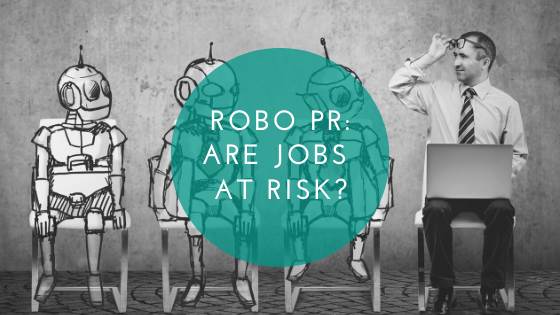
Robo PR: are practitioner’s jobs at risk?
A recent guest blog by Eleonora Terzi on Wadds.co.uk discussed the need for PR practitioners to get ahead of Artificial Intelligence. In the post, Eleonora outlines the important questions she is addressing in her postgraduate dissertation, such as how AI will affect jobs and skills in the industry, and reassures readers that we are a long way from the feared situation of AI becoming too intelligent; the bots are not taking over anytime soon.
“Like many other practitioners, I am hopeful that a transparent future for AI is indeed possible – if the correct effort is put in making this a reality. I expect the skills we have learned so far will still be useful; however, it can be argued that in order to be indispensable hereafter, a new set of competencies will have to be mastered.”
– Eleonora Terzi, 2020
The blog reminded me of a short blog I wrote back in 2016 sharing my views on whether the public relations industry was under threat from AI. That post was inspired by a conference talk on how AI could transform the workplace, and reports at the time that showed nearly half of job roles could be replaced by AI capabilities. Back then, other professions were being told that their jobs were at risk due to technological advances, and there seemed to be a particular focus on how robots would supposedly replace teachers. My prediction at the time was that AI would not replace PR practitioners in our lifetime.
So, nearly half a decade on, has the threat level changed?
The fact that Artificial Intelligence has begun to receive more attention from public relations scholars could indicate that it is becoming more relevant in the field.
Thinking positively, AI could help to solve the industry’s problem with work/life balance. In the CIPR State of the Profession 2019 report, the top three factors contributing to workplace stress were “heavy/unmanageable workload”, “unrealistic deadlines”, and the “always on culture”. Applications that successfully take some of the repetitive, administrative, or analytical workload off practitioners – for example, scanning media coverage for sentiment – could lighten the load and lead to improved overall wellbeing for practitioners. In the same report, only 12% of respondents cited “job insecurity” as a cause of workplace stress, so practitioners do not currently seem overly worried about any encroachment of AI.
Public relations practitioners are also expected to possess an increasingly diverse skill set, so I have no doubt that successfully working alongside AI capabilities is well within our grasp. Besides, there is speculation that in the coming years AI will start to create more jobs than it eliminates – it’s possible that PR roles will shift to include tasks such as “training” AI, but the humans wont be replaced by that AI. Rather, it could free practitioners up to perform higher-level, more strategic PR whilst algorithms take care of the boring jobs.
It may be that in the coming years, PR teams could attempt to use AI as a content creation tool, but there are serious risks. This was demonstrated recently when Microsoft replaced human journalists with artificial intelligence code. The AI failed to tell Jade Thirlwall apart from another mixed-race member of the pop group, Leigh-Anne Pinnock, using a photo of the latter to illustrate a story about the former. Ironically, the theme of the article in question was racism. Hopefully, public relations practitioners are more aware of the impact that biased AI can have on reputation – if not society as a whole – and would be more careful in deploying similar software.
At its core, public relations is still based upon relationships, with authenticity and trust two key elements of that. Artificial Intelligence is far from being able to replicate the ability of humans to cultivate relationships, and so I still believe that the robots are not coming for our jobs.